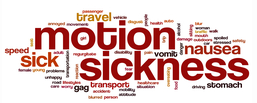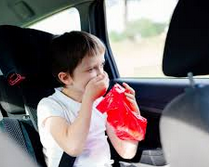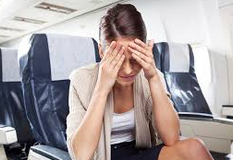Motion sickness is a collective word for a combination of unpleasant symptoms such as dizziness, nausea and vomiting that can occur when travelling. Motion sickness occurs because the brain receives conflicting messages from the eyes (visual messages) and ears (spatial awareness/balance).
Anyone can suffer from motion sickness but some people are more susceptible, such as children between the ages of two and twelve years. Once children reach their teenage years most of them grow out of it. Women are also more susceptible than men especially when pregnant or having their period, and migraine sufferers are also more likely to suffer from motion sickness and may have a migraine at the same time. Strong smells, anxiety and trying to read a map when travelling can all trigger symptoms.
Symptoms of Motion Sickness
The symptoms usually begin with:
- An increasing feeling of being unwell
- Discomfort in the upper abdomen
- Nausea
- Pale Skin
- Cold Sweat
- Dizziness
- Vomiting
Additional Symptoms may also be experienced by some people, particularly adults that do not vomit:
- Headaches
- Rapid, Shallow Breathing
- Drowsiness and or extreme tiredness
- Increase salivation
Treating Motion Sickness

Motion sickness can be managed through self-care techniques and/or medication. There are a number of techniques you can suggest to customers to help them manage their motion sickness.
Minimise head and body movement - advise people to sit in the middle of a boat or plane as there will be less movement. Try to reduce head movement by using a headrest or pillow.
Focus on a fixed object - many people find focusing on but not staring at a fixed object relieves their symptoms. When on a boat focusing on the horizon is known to help or closing your eyes or trying to sleep can sometimes help.
Distract the brain - listen to music or do a mental activity such as counting backwards. This can help with relaxation. Avoid playing games or trying to read as this may aggravate the symptoms
Fresh Air - Open Windows or move into fresh air and keep cool where possible
Food and drink - Avoid consuming large meals, especially spicy or fatty food and avoid alcohol before travelling
Reduce stress - worrying about a journey can make you more likely to experience motion sickness therefore remaining calm may help to alleviate symptoms
Medication for Motion Sickness

There are two types of medication that be taken to treat the symptoms of motion sickness. It is recommended that any medication is taken before a journey to prevent symptoms as motion sickness delays digestion and therefore reduces absorption and efficacy of the medication.
Hyoscine hydrobromide is the most commonly used medication for motion sickness and this can be purchased as an OTC treatment for children aged over 4 years.
Antihistamines can also be effective at treating or preventing motion sickness.
Ginger (fresh and supplements) - There is a long history of being used as a treatment for nausea and vomiting but there is little evidence to recommend it as a specific treatment for motion sickness.
Accupressure bands - these are stretchy bands that are placed on the wrists that apply pressure on a point between two tendons that run down the inner arm. There is some research conducted which shows that stimulating this point can have a beneficial effect in reducing nausea/vomiting.
